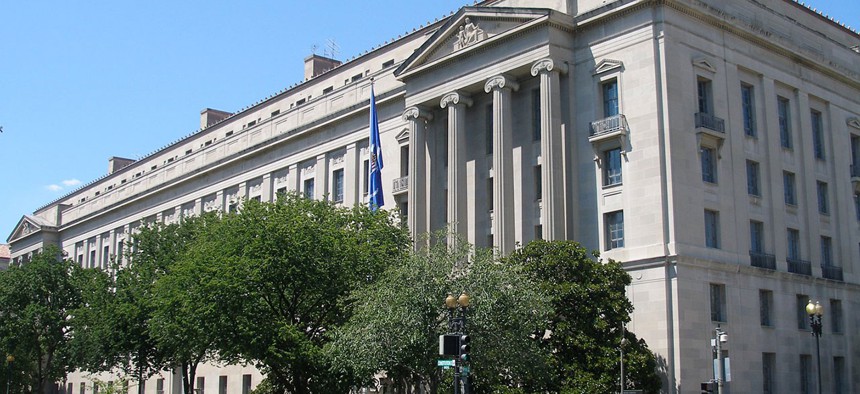
Ross Gianfortune/GovExec.com
Analysis: Trump’s DOJ Was More Dangerous Than We Knew
Revelations since Biden’s inauguration are adding detail to a portrait of ethical decay at the department.
Sometimes, the actions a government takes look bad at the time, but posterity treats them kindly. Other times, a president might look good in the moment but see his reputation sink in retrospect. Then there’s the Trump administration, and especially its Justice Department, which looked bad when it was in power and now looks even worse.
Late yesterday, The New York Times reported that the Justice Department subpoenaed Apple to try to obtain data from accounts belonging to Democratic members of the House Intelligence Committee Adam Schiff and Eric Swalwell, their aides, and even one of their children as part of an investigation into leaks about Trump associates’ ties to Russia. Even after the probes produced few results, Attorney General Bill Barr insisted that prosecutors keep them alive.
[David A. Graham: What’s the Justice Department actually for?]
This is only the latest ugly revelation about the Trump Justice Department to emerge since January 20—sometimes despite the best efforts of the Biden team to keep things secret. We now know that prosecutors sought to compel records of reporters from The Washington Post, CNN, and the Times; failed to prepare for right-wing violence because of a focus on antifa; and even saw a plot by the assistant attorney general and the president to oust the acting attorney general in order to overturn the result of the presidential election.
The scope of the subpoenas disclosed last night by the Times is still not clear. Schiff and Swalwell were perhaps natural suspects for the White House, because they were among the noisiest of the president’s critics. Yet if that’s the case, that makes the subpoenas only more troubling, because they then smack of political retribution. It is not unusual for members of Congress to be investigated by federal law enforcement—corruption cases against members are distressingly common and warranted—but a leak hunt has seldom if ever targeted members in this way. (The subjects only recently learned of the subpoenas from Apple, which had previously been under a judicial gag order.)
[Read: The call was coming from inside the White House]
The odor of revenge is especially strong, given that initial attempts to tie the leaks to the men had sputtered. “Ultimately, the data and other evidence did not tie the committee to the leaks, and investigators debated whether they had hit a dead end and some even discussed closing the inquiry,” the Times reports. “But William P. Barr revived languishing leak investigations after he became attorney general a year later.”
Two ironies emerge from the story. The first is that the Barr DOJ’s politically motivated leak hunt was hobbled by the administration’s politically motivated release of some of the secret material in question: “John Ratcliffe, the director of national intelligence and close ally of Mr. Trump’s, seemed to damage the leak inquiry in May 2020, when he declassified transcripts of the calls. The authorized disclosure would have made it more difficult for prosecutors to argue that the news stories had hurt national security.”
[David A. Graham: Barr misled the public—and it worked]
The second is that although we still don’t know where the leaks did in fact originate, a great deal of the damaging leaks during the Trump administration came not from its political enemies but from inside the administration. Members of the administration leaked information as part of political ploys, as part of internecine power struggles, for self-aggrandizement, and probably just for amusement. The president himself was a prolific leaker. Detective, investigate thyself!
These new stories about the Trump DOJ do not qualitatively change the existing impression of a department that was weaponized for personal gain, run by unqualified and/or malevolent actors, and reoriented to political warfare. Under Jeff Sessions, the department aggressively undermined civil-rights protections and spearheaded a push to separate immigrant families at the southern border. When Sessions was finally defenestrated for, remarkably, being too politically independent, he was replaced by a wildly unqualified political hack, Matthew Whitaker. Whitaker was never formally nominated for the job, probably because he was unconfirmable, and was replaced by Barr. A formidable lawyer and former attorney general, Barr was clearly qualified, but also comfortable using the department for malign purposes, including misleading the public about Special Counsel Robert Mueller’s report and espousing bizarre conspiracy theories ahead of the election. Things could have been worse still. To Barr’s credit, and to the credit of Jeffrey Rosen, his interim successor who was the target of the internal coup, the Justice Department resisted Trump’s pressure to try to overturn the election after the fact.
Yet the new revelations do more than add fine detail to the existing portrait of decay. These stories are important for understanding the abuse and politicization of the Justice Department and how it could be repeated by any future administration. They also demonstrate why Merrick Garland faces the biggest challenge of any attorney general since Watergate to reforming his department—and perhaps an ever greater one.
This article was originally published in The Atlantic. Sign up for their newsletter.






